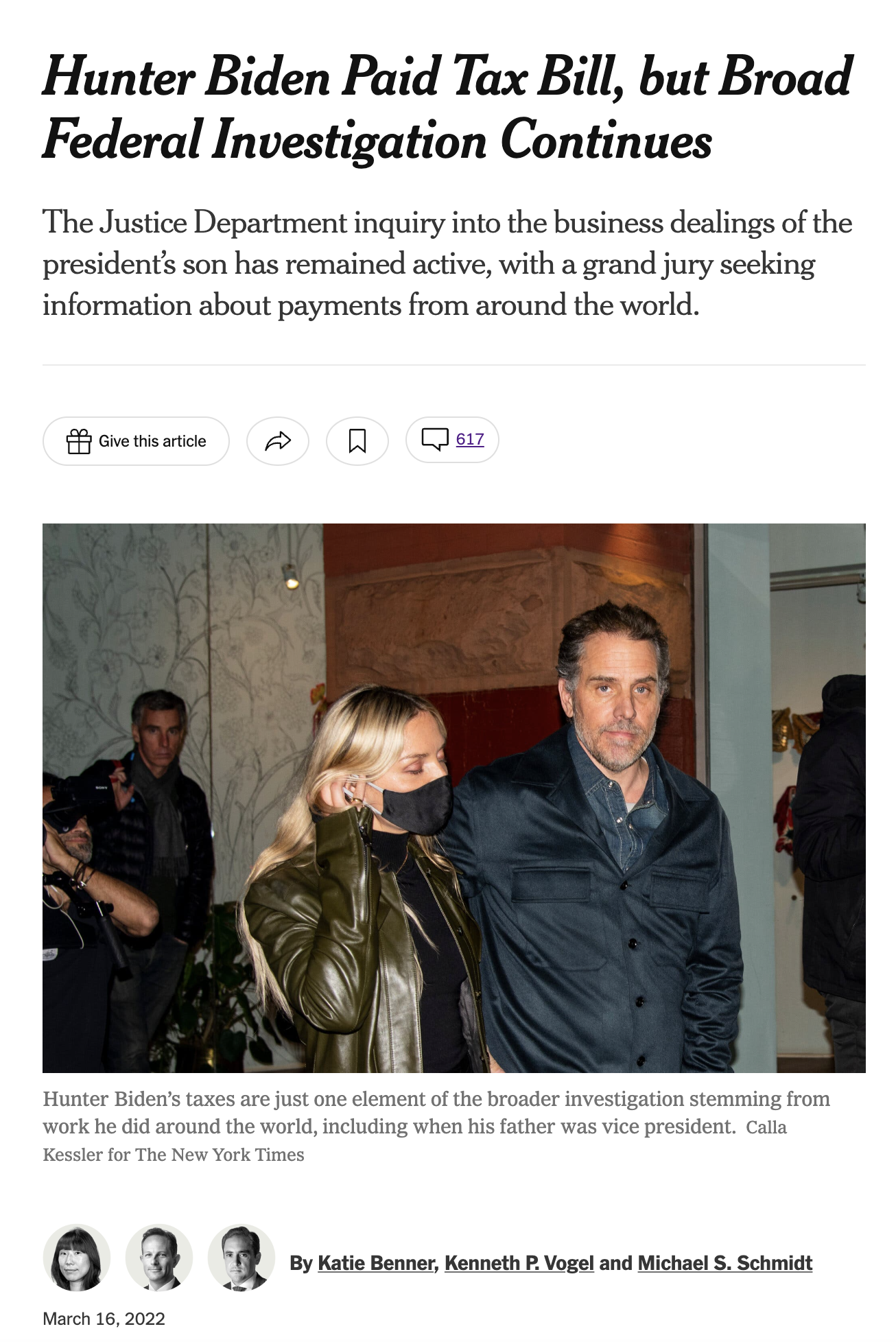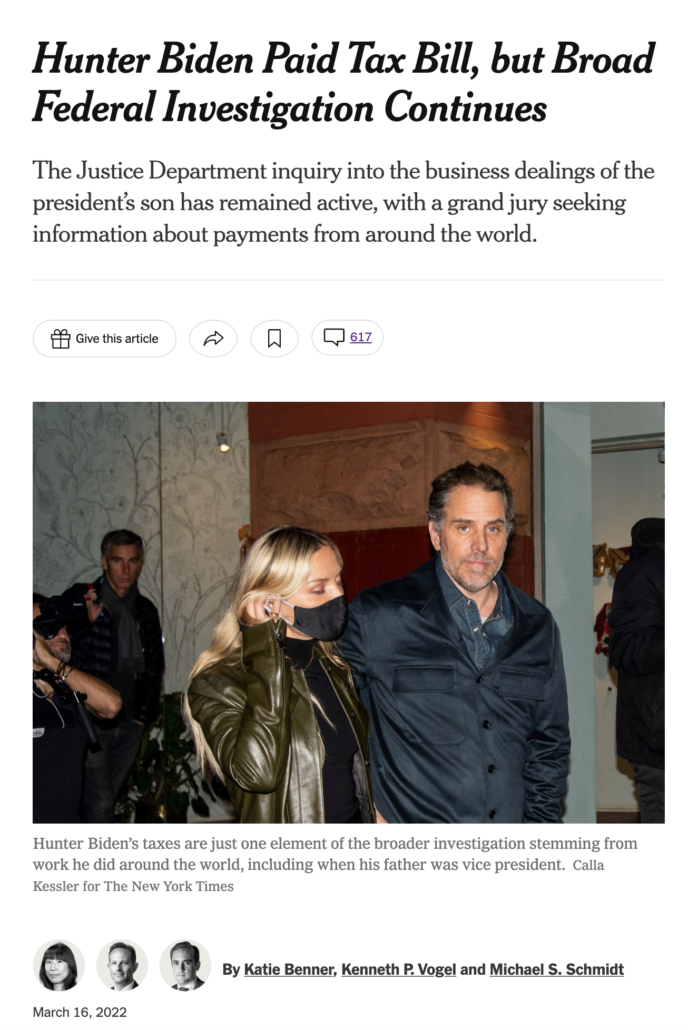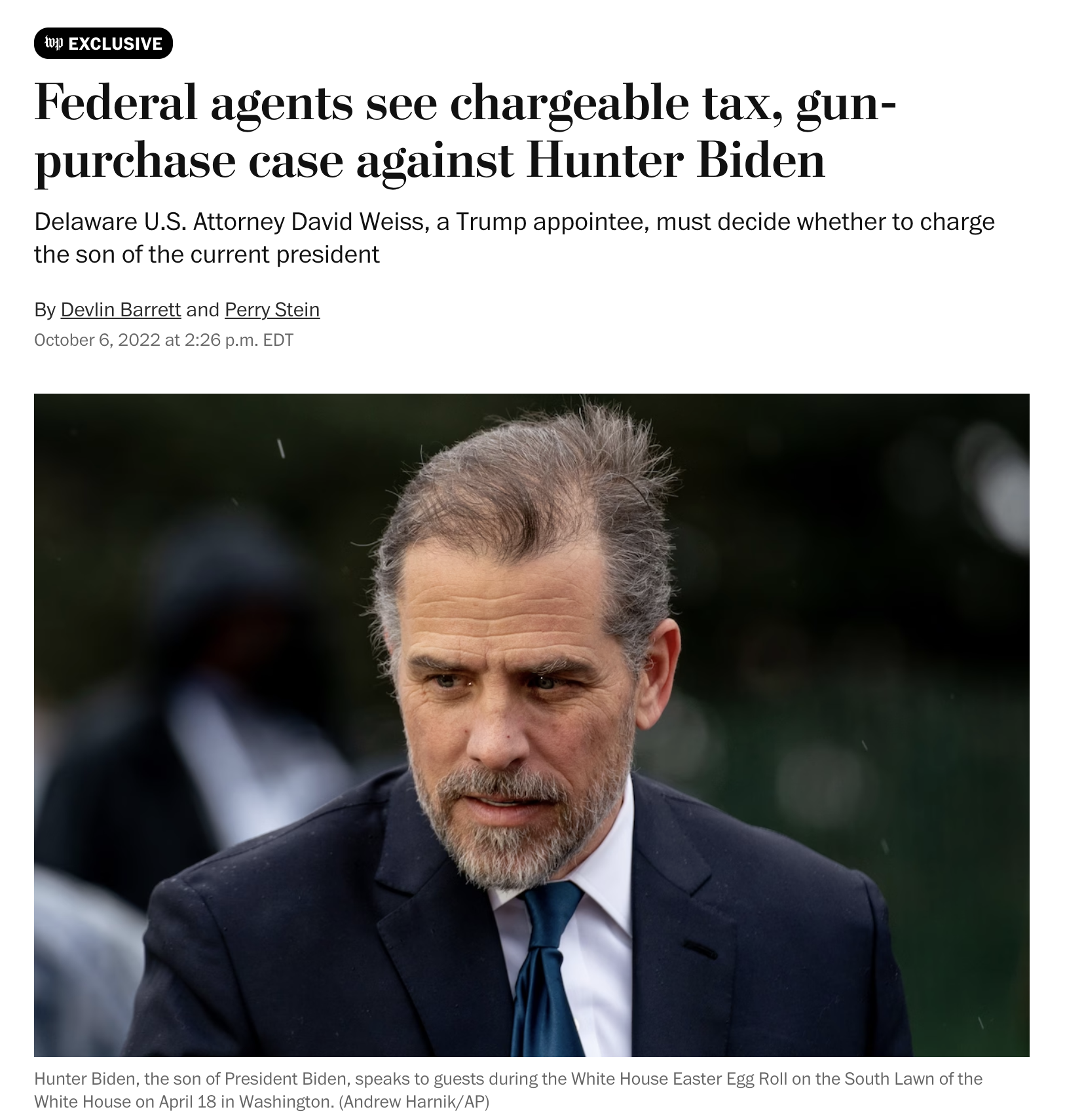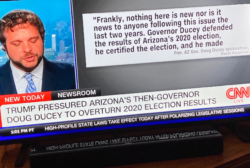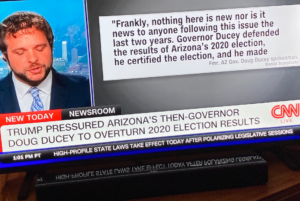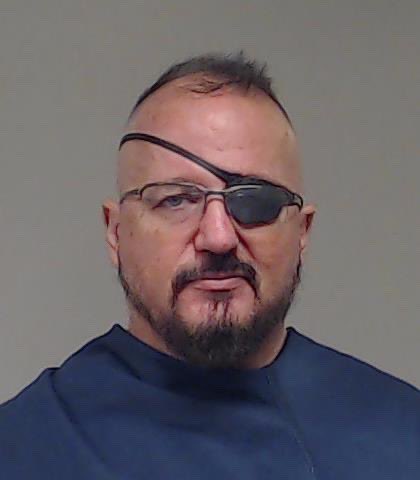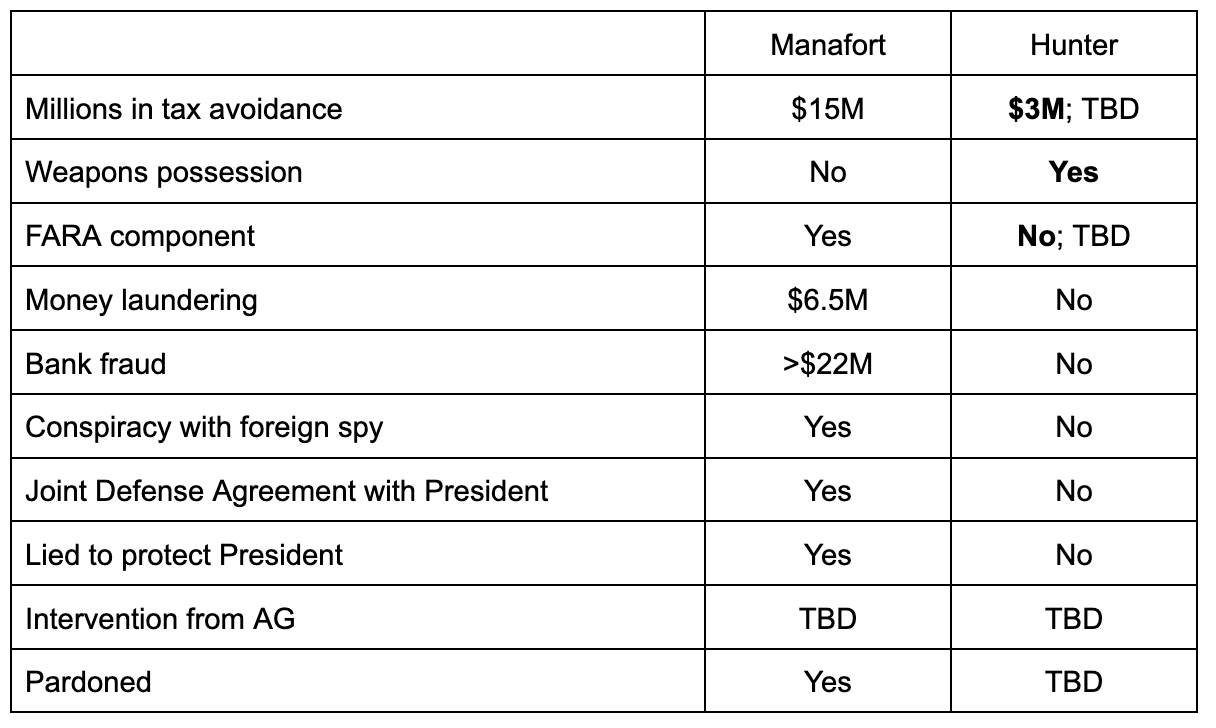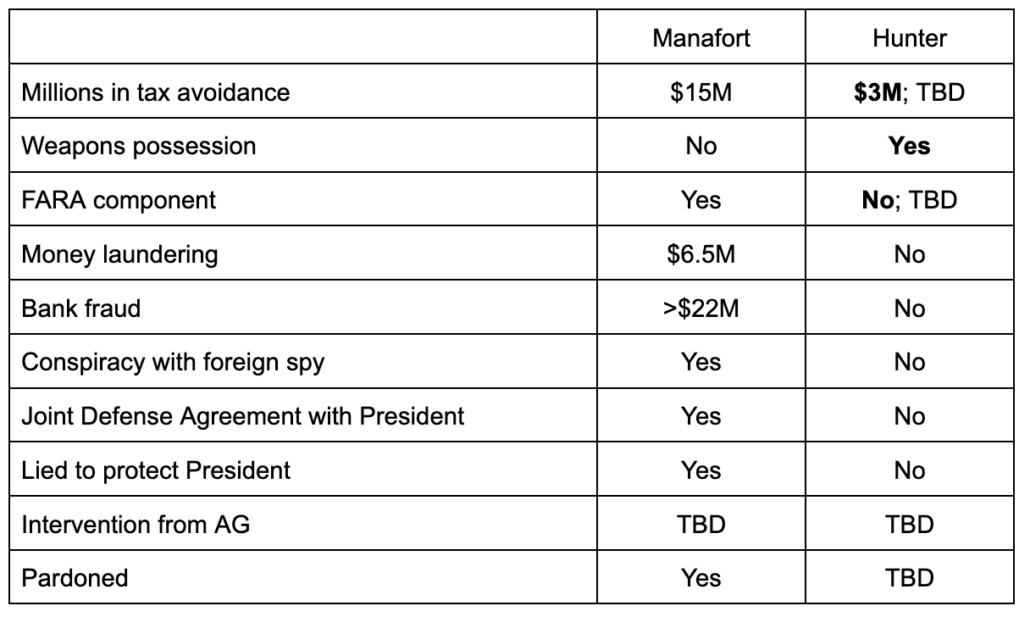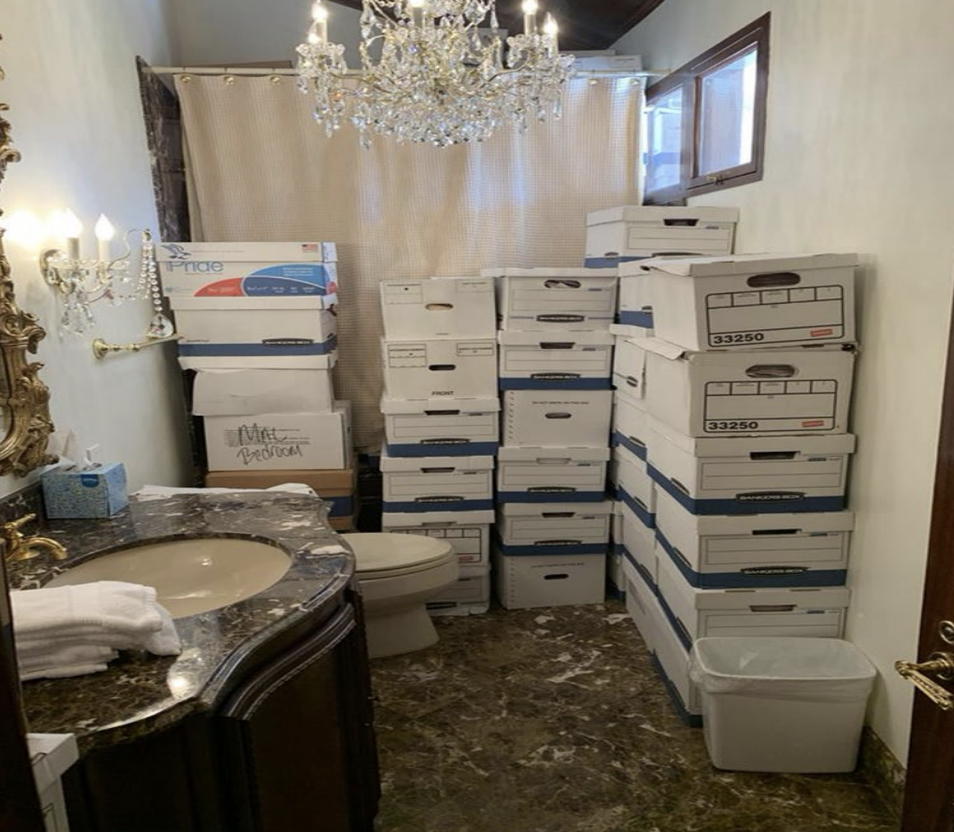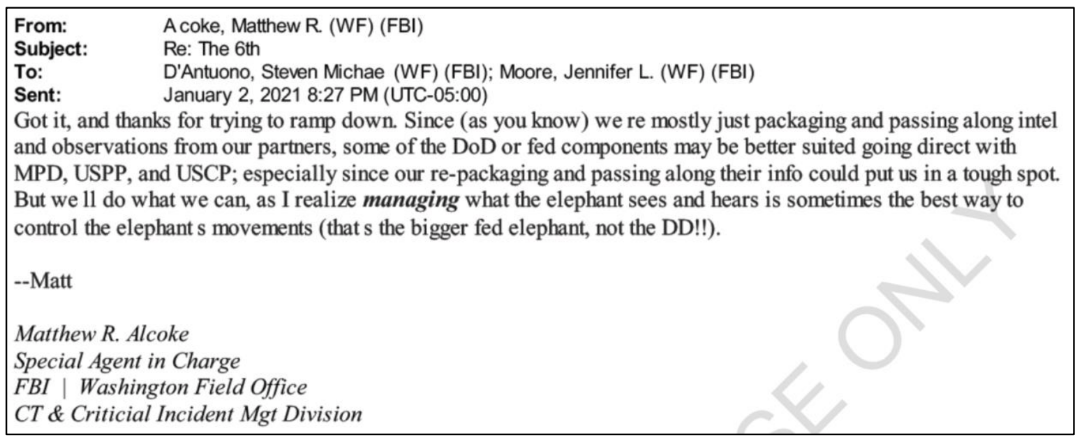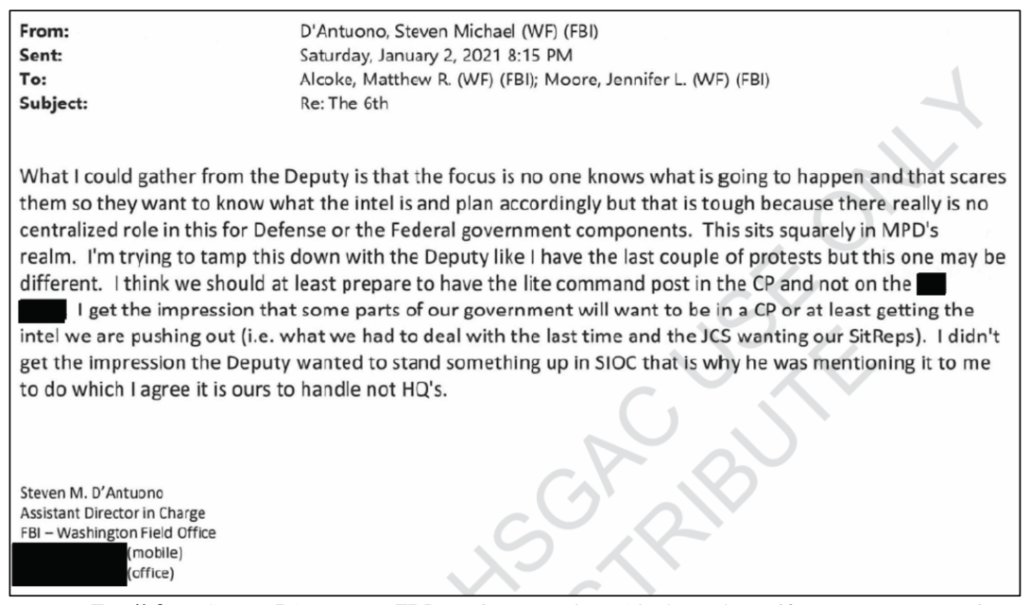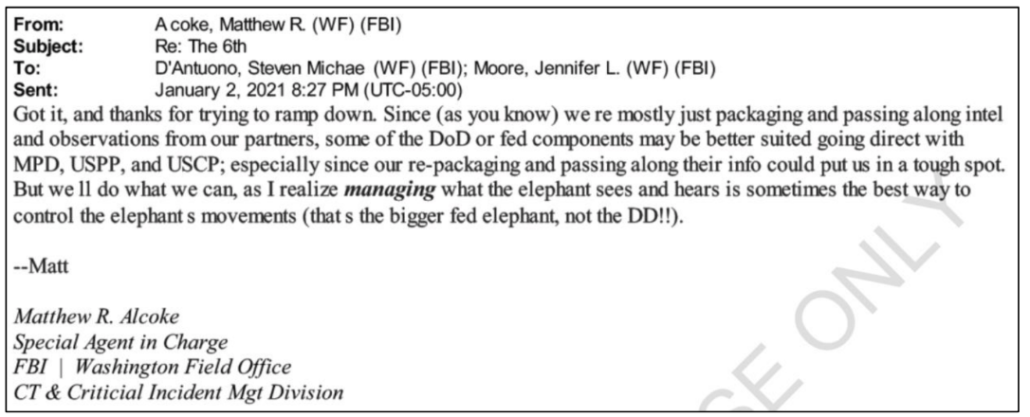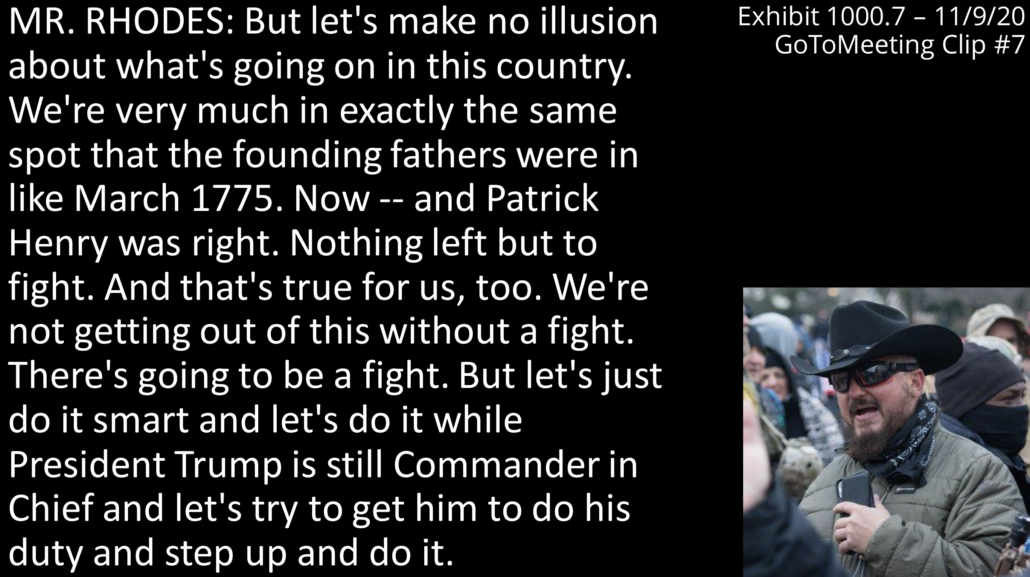There’s a line in Whistleblower X’s testimony that hasn’t gotten enough attention amid the uncritical treatment of Gary Shapley’s media tour claiming improper political interference in the investigation of Hunter Biden.
Whistleblower X described that when investigators asked late last year why prosecutors hadn’t yet charged Hunter Biden, they learned that the attorneys had “found some emails” that made them question whether “they could actually charge the case.”
So we found out through talking with our SAC that the attorneys had found — we were always asking for updates on charging. When are we going to charge? When are we going to charge? We were told that the prosecutors had found some emails that concerned them if they could actually charge the case. That’s what they said to us.
This explanation — that prosecutors had discovered emails that made them question whether they could charge the case, at all — would present an entirely different explanation for the delayed (and seemingly softball) charging decision with regards to Hunter Biden, one for which there is abundant evidence in the two transcripts, yet one that has been ignored by lazy journalists.
It suggests there may be evidence of past misconduct that, if shared with Hunter Biden’s lawyers in discovery, would lead to dismissal of the entire case, or at least an acquittal.
Non-Virgin Birth
Start with how the investigation was set up. Shapley described that the investigation into Hunter Biden was spun off of an investigation into what he called a “foreign-based amateur online pornography platform.”
The investigation into Hunter Biden, code name Sportsman, was first opened in November 2018 as an offshoot of an investigation the IRS was conducting into a foreign-based amateur online pornography platform.
Whistleblower X, who opened the case immediately after joining the International Tax and Financial Crimes group, described that “amateur online pornography platform” differently; he described it as a “social media company” that may have hosted a prostitution ring.
I started this investigation in November of 2018 after reviewing bank reports related to another case I was working on a social media company. Those bank reports identified Hunter Biden as paying prostitutes related to a potential prostitution ring.
Also included in those bank reports was evidence that Hunter Biden was living lavishly through his corporate bank account. This is a typical thing that we look for in tax cases — criminal tax cases, I should say.
Remember that Whistleblower X has a habit of seeing sex workers everywhere he looks.
Whistleblower X then went from there to look for evidence of crime in public reporting on Hunter Biden’s divorce proceedings.
In addition, there was media reporting related to Hunter Biden’s wife, ex-wife, divorce proceedings basically talking about his tax issues. And I wanted to quote some of the things that were said in her divorce filing which was public record.
“Throughout the parties’ separation, Mr. Biden” — referring to Hunter Biden — “has created financial concerns for the family by spending extravagantly on his own interests, including drugs, alcohol, prostitutes, strip clubs, gifts for women with whom he had sexual relationships with, while leaving the family with no funds to pay legitimate bills.
“The parties’ outstanding debts are shocking and overwhelming. The parties have maxed-out credit card debt, double mortgages on both real properties they own, and a tax debt of at least $300,000.” [my emphasis]
Then, in response to questioning from Minority Counsel, Whistleblower X described how, on his third attempt to open the investigation, he ran bank reports for Burisma, which is what convinced his supervisor to permit him to open the investigation.
Mr. X. My initiation packet, so sending the case forward to get — we call it subject case. It’s an SCI. It’s elevating the case to actually working the investigation. My first one showed the unfiled returns and the taxes owed for 2015 and that was it on my first package. So that was the wrongdoing that we were alleging.
And my supervisor goes: You don’t have enough. You need to find more.
So I kept digging for more and more. And even after that point, he goes: You haven’t found enough. So I ended up searching bank reports that [I] ran on the periphery of what we were looking at.
So I ran bank reports for Burisma, and in those bank reports I had found additional payments that Hunter had received. And then at that point I had found that Hunter did not report the income for 2014 related to Burisma.
So now I had a false return year. So that alone — it was basically so much evidence that I put in there — allowed us to elevate the case.
A potentially “amateur” sex worker site, to divorce proceedings, to Burisma. It all sounds like an effort to find a crime, and finding that crime has been a significant focus of a 12-person international tax group supposedly tasked to find much more significant tax crime ever since.
I don’t think anyone asked how long this process of making three bids to open an investigation into Hunter Biden took. So it’s actually unclear how the timing works with the investigation in Delaware opened in January 2019.
So in [or] around March or April of 2019, the case went up to DOJ Tax. And at that time we were told that William Barr made the decision to join two investigations together. So at that point in time I had found out that Delaware had opened up an investigation related to the bank reports and that that occurred in January of 2019, so 2 months after I started mine.
Likewise, there has never been an explanation for what predicated the separate investigation in Delaware opened in 2019, though NYT describes that an existing civil review of Hunter Biden’s tax problems became a criminal investigation that also included the foreign influence peddling, largely, Burisma, that appears to have since been dropped.
Then, we learn, that shortly after Barr was confirmed, and in a period when he was trying to reverse the prosecution of Michael Cohen, sustaining investigations into Greg Craig and Andrew McCabe, perpetuating efforts to seed an investigation into John Kerry, and launching a four year witch hunt based off fabricated claims about Hillary Clinton, the Attorney General consolidated everything in Delaware — the perfect venue if Joe Biden is your target but (as Whistleblower X noted), the wrong place for Joe Biden’s son, who lived in LA or DC during the alleged crimes in question.
Documented Sixth Amendment Concerns
How all this got started matters, because this early period may be when adverse emails that could make it impossible to prosecute Hunter Biden at trial got put into the record.
That’s because Whistleblower X’s supervisor for the first period of the investigation — for a period that may have spanned over 14 months — believed there were Sixth Amendment and political influence problems with the investigation.
When describing how this perturbed him, Whistleblower X freely admitted that he was reading everything in the press about Hunter Biden (that detail will become important later) and that he went to his supervisor’s boss to get his boss to stop raising concerns about Trump’s tweets.
Whistleblower X described his supervisor Matt Kutz’ concern about Trump’s tweets — a direct example of precisely what Republicans are searching for, inappropriate Presidential interference!! — as exhibiting a liberal viewpoint.
From what I was told by various people in my agency, my IRS supervisor, Matt Kutz, created memos which he put in the investigative files regarding the investigation potentially violating the subject’s Sixth Amendment rights. He also referred to Donald Trump’s tweets at the time.
I recall that at one point I had to go around my supervisor and ask his boss, ASAC George Murphy, to tell him to stop sending me and the Hunter Biden prosecution team these emails and that I was searching media articles on a weekly basis and was aware of everything being written in the media regarding the case.
[snip]
A So it was actually Matthew Kutz. He was my supervisor at the time and from the articles that he was sending me, I would say he had more of a liberal view than I had and it was pretty obvious from the things he would send me and discuss. And that’s just me making an observation.
So I later found out about these memos that were put in the file regarding the issues that he saw with the investigation, the fact that we even had it opened. So I only learned about those after.
And then it came to a point to where he’s sending us so many media articles about different issues that I had to tell him stop, please. And I had to go around him. And that’s when I went to my ASAC at the time, George Murphy, who was above him. [my emphasis]
After learning of an example of Presidential interference, but from Trump, GOP staffers in the interview interrupted the Minority’s questioning by going off the record about something, as if they were the witness.
MAJORITY COUNSEL 2. Off the record.
MAJORITY COUNSEL 1. Off the record.
[Discussion off the record.]
MAJORITY COUNSEL 1. On the record.
That off the record discussion appears to have discussed why Whistleblower X believed that his supervisor’s concerns about the Sixth Amendment were proof of liberal bias, because that’s what Whistleblower X explained immediately after going back on the record. And then, Whistleblower X explained to Minority Counsel, that Matt Kutz raised concerns four years ago about whether this could ever be prosecuted.
Mr. X. So these articles were a lot about — were a lot of articles regarding Trump and getting a fair investigation and things related to that, Trump’s tweets and stuff like that. So, that’s what drew me to my conclusion.
BY MINORITY COUNSEL 1: Q What was the purpose behind him sending you the Trump tweets? What was he trying to get at, or was he trying to give you more information for your case? Why would he send those, or do you know?
A Yeah, I think he was bringing up concerns with potentially us prosecuting the case down the road, potential issues we’re going to incur. I don’t remember the exact email that he sent that caused me to be — that he had to stop sending me some of the news articles, because it wasn’t even the fact that he was sending me these news articles.
It was the opinion he was providing in those emails that I did not agree or that I did not — not agree with but did not think was appropriate. [my emphasis]
Whistleblower X told us in one part of the interview that prosecutors had found something in the email record that led them to worry they could not prosecute this case at all, and then in another part of the interview he told us that the supervisor for the first year or so of this investigation believed they would have problems prosecuting it down the road because of Trump’s constant badgering for precisely this investigation.
Maybe, just maybe, the reason no US Attorney’s Office wanted to take this to trial is because this investigation was plagued by inappropriate tampering from the other President from the start?
Gary Shapley’s Involvement
In January 2020, in the same period when Bill Barr was setting up an alternative channel via which DOJ could ingest dirt about Hunter Biden that Russian spies shared with Rudy Giuliani, Gary Shapley became Whistleblower X’s supervisor, overseeing the 12-person International Tax group that would hunt Hunter Biden for five years.
Now is probably a good time to note that Shapley — who splits his time between Baltimore and DC — seems to have a good relationship with Rod Rosenstein, a Maryland AUSA who went on to become US Attorney and then Deputy Attorney General during a period when DOJ was launching politicized investigations into Trump’s enemies.
Mr. Shapley. No. I think I’ve said it, that this is not the norm. This is — I’ve worked with some great guys, some great prosecutors that went on to be U.S. attorneys and went on to be the deputy attorney general and, I think I have experience enough to where it means something.
As noted, Shapley became Whistleblower X’s supervisor just as Barr was setting up a protected means to ingest dirt pertaining to Burisma. But by his own description, Shapley didn’t start liaising more closely with David Weiss until later….
… Until Rudy Giuliani released the laptop.
From around October 2020 through October 2022, I was the IRS CI manager who interacted directly with the United States Attorney, David Weiss, and individuals at DOJ Tax Division the most.
This coincidence — that Shapley became more involved just after Rudy disclosed that a blind computer repairman had shared a laptop with the FBI before he himself, the President’s personal lawyer, got a copy — may be significant.
The Really Really Really Dated Claim about the Laptop
By Shapley’s description, he contacted the AUSA on the case, Lesley Wolf, and not only complained that the FBI was misrepresenting the laptop (when in fact they were mostly no-commenting), but also raised the possibility that John Durham may have searched the laptop.
On October 19th, 2020, I emailed Assistant United States Attorney Wolf: “We need to talk about the computer. It appears the FBI is making certain representations about the device, and the only reason we know what is on the device is because of the IRS CI affiant search warrant that allowed access to the documents. If Durham also executed a search warrant on a device, we need to know so that my leadership is informed. My management has to be looped into whatever the FBI is doing with the laptop. It is IRS CI’s responsibility to know what is happening. Let me know when I can be briefed on this issue.”
In his congressional testimony Durham specified that Hunter was the one Trump enemy he hadn’t been ordered to investigate — but remember that there were reports Ukrainians brought dirt to him.
In his testimony, Shapley admitted that the investigative team called this meeting because, “we were just making sure that everything was being handled appropriately.” But he emphasized Whistleblower X’s complaints that parts of the laptop had been withheld from investigators.
As I noted in this post, per Shapley’s own notes, that’s not what the bulk of the meeting was about.
Of 43 numbered entries, just eight deal in part or in whole with access Whistleblower X had, and some of that is conflicting [note that Shapley misspells Cellebrite “cellabright” throughout]. Here’s what those eight numbered entries describe:
- 14a. Describing that the John Paul Mac Isaac 302 about what he saw on the laptop was being withheld from the prosecution team (as a whole), even though the taint team had found no privileged items discussed in it
- 25. Describing that Whistleblower X had never seen a PDF version of the Cellebrite report from the drive, but instead had to look at the device itself
- 29. Describing Whistleblower X asking whether all the iMessages that were relevant and non-privileged had been reviewed, the answer to which the team didn’t know immediately [this seems to confirm the IRS was not doing the scope review of the laptop]
- 30. Describing that all messages from the hard drive had been shared in the third disclosure to investigators in February 2020, which seems to partially address item 29
- 33. Discussing a March 2020 email describing limits on the quality and completeness of the recovery of the hard drive; in response to Whistleblower X’s complaint that he hadn’t seen it, an AUSA (probably Wolf) said they would eventually see a redacted version of the report
- 40c. Quoting Whistleblower X complaining [it’s unclear whether this is in an April 2020 email or live] that he never saw the Cellebrite file
- 41. Describing that the Cellebrite file was uploaded sometime in May [which may refute 40c]
- 42. Describing Whistleblower X stating that if they’re going to testify, they need to see everything, in response to which Lesley Wolf said they would return to that issue
Most of the report seems to be an effort to ascertain legal chain of custody, given the discovery that the original source of the laptop had just spent the last few months turning it into a campaign season political hit job. But amid that discussion, Whistleblower X appears to have aired a series of complaints about decisions DOJ made about access in the interim year.
In his testimony, Shapley also made much of the final bullet point in his notes — the only part of the memo, aside from Whistleblower X’s complaints, that memorializes contemporaneous discussion. In his testimony, Shapley quoted AUSA Lesley Wolf stating, just over a week after NYPost released their first story on the laptop, that there was no reason to think anything had been added to the laptop.
We have no reason to believe there is anything fabricated nefariously on the computer or hard drive. There are emails and other items that corroborate the items on the laptop and hard drive.
Shapley repeated that judgment from October 2020 in May 2023 uncritically, as if it is remotely definitive.
AUSA Wolf acknowledged that there was no reason to believe that any data was manipulated on devices by any third party. She further supported this belief by mentioning that they corroborated the data with other sources of information received.
Right wingers are predictably going nuts over this, claiming it proves something it does not.
Even ignoring the timing of Wolf’s comment, just days after the initial disclosure of the laptop, this comment falls far short of validating authenticity of the laptop. Wolf was only validating the laptop — all of it!! — by matching data points. Importantly, “the computer guy” at the meeting (who could probably spell Cellebrite correctly) proposed doing a report showing document creation date.
If the FBI did that after that meeting, Shapley chose not to disclose the outcome. Given what we know about Mac Isaac’s treatment of the laptop, such a step might have showed whether the blind computer repairman’s failure to airgap the machine resulted in email updates — including from the recently hacked Burisma — being loaded to the laptop.
More importantly, the discussion shows that a year after the government obtained the laptop, no one had yet done this kind of validation of the laptop (and given the recovery problems with it, it’s not entirely clear they could). A year after obtaining the laptop, the government was still just working off trust in Mac Isaac’s sketchy and changing story.
Plus, it’s one thing to say the laptop as Mac Isaac delivered it to the FBI had nothing added, if that’s true, but we know that the laptop as released by Rudy did have alterations. And the fact that Rudy altered the laptop in the midst of launching an election-year attack discredits any claim that anyone makes about the laptop as released by him.
Whistleblower X’s Hot and Cold Affection for Forensic Reports
One of Whistleblower X’s serial complaints about the laptop — that he couldn’t get the Cellebrite report of the laptop itself, items 25, 40c, and 41, above — is of particular interest: That’s because the WhatsApp messages that Shapley shared with the Committee, showing Hunter Biden invoking his father in an attempt to get business in China, also did not come from the forensic format in which they’d be received from Apple.
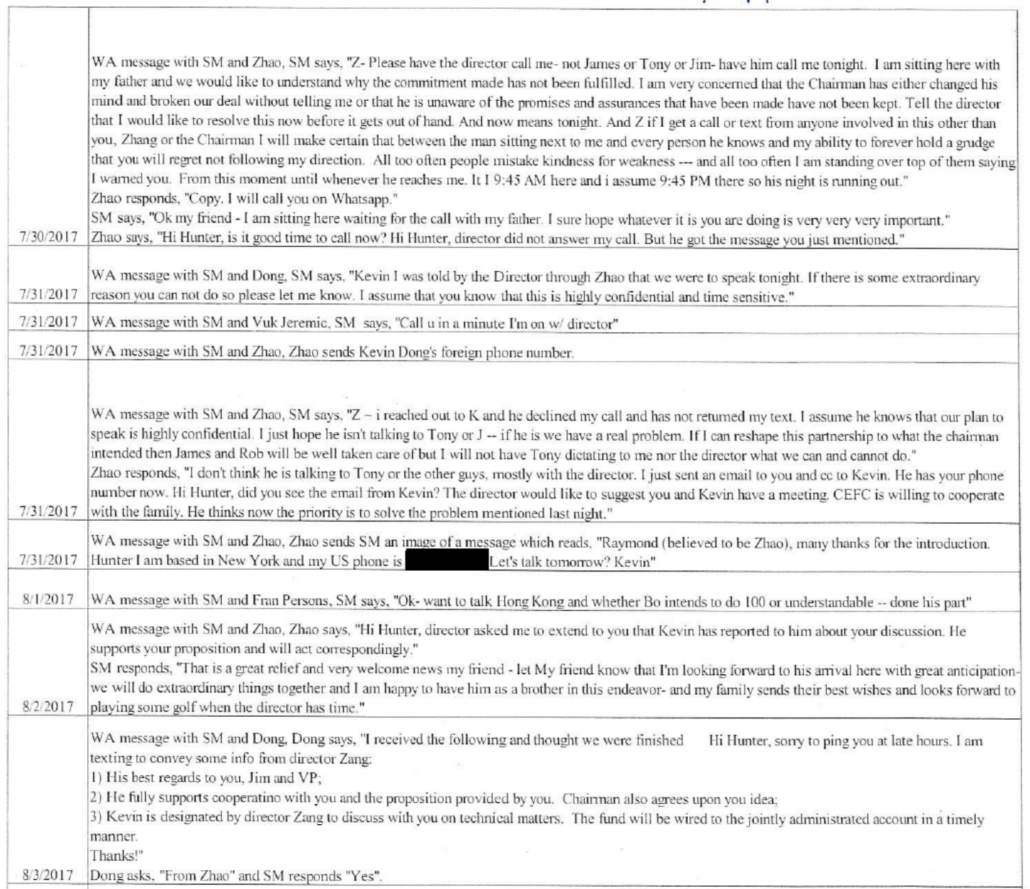
In fact, they’re not even direct copies of the report from Apple — they are summaries, as Shapley admitted to the Committee. Shapley doesn’t even know who did the summary.
Q Could you tell us about this document, what is it, and how was it obtained —
A Sure. So there was an electronic search warrant for iCloud backup, and these messages were in that backup and provided —
Q Okay.
A — from a third party, from iCloud.
Q Okay. Who was it provided to?
A The — the investigative team from —
Q Okay. A It would go through all the same processes of — since it’s electronic, it would go to one of the computer analysis folks, and then they would put it in a readable format, and then it would go through filter review.
Q Okay. And these aren’t WhatsApp messages, these are summaries of WhatsApp messages, correct?
A Yeah, that’s correct. Because it was something about the readability of the actual piece, right? It was easier to summarize in a spreadsheet.
Q Okay. And who did the summary? Who prepared this document?
A It was either the computer analysis guy or [redacted, probably Whistleblower X], one or the other
This is the content that the Committee tried to recreate to look like real messages, only to mix message type and appearance.
Here’s what an FBI production from WhatsApp messages obtained from an iCloud warrant would look like in official admissible form, from an exhibit in Vladislav Klyushin’s trial.
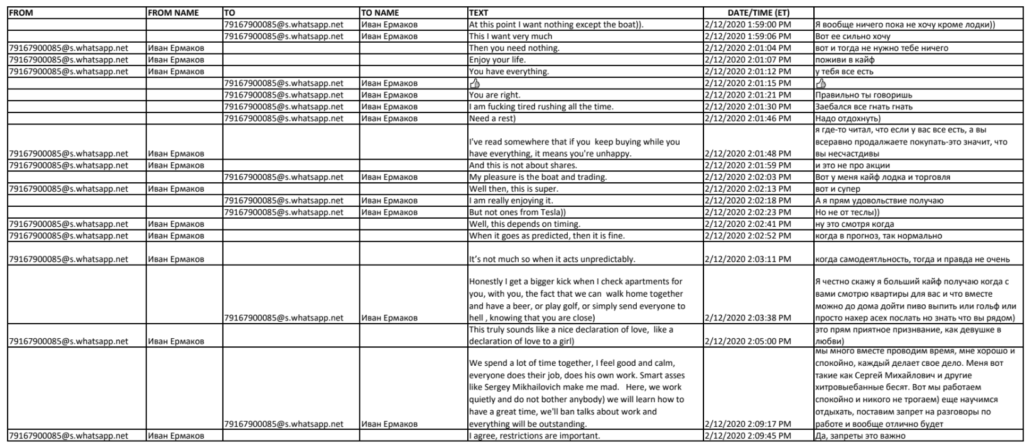
It is also a reconstruction (and includes translations), but one that has enough information to afford reliability. It’s also entirely readable.
There’s simply no reason to further summarize from there, much less to do so without all the metadata included, as the IRS reportedly did. It’s not the Committee that first did sketchy reconstructions. Shapley, or Whistleblower X, did, off material they claimed to obtain directly from a warrant return.
These WhatsApp messages from Hunter Biden’s iCloud are important for several reasons: notably, that investigators reportedly had them in hand, directly from Apple, by August 2020, possibly relying on the laptop they had not yet fully validated to get them, then using them to validate the laptop content, the kind of investigative bellybutton that can get a case thrown out.
Further, when discussing them, Whistleblower X makes much of the fact that he wasn’t able to get location data to see whether Hunter was with his father when he sent these emails.
They had just served a search warrant on Apple, which should have gotten a good deal about Hunter Biden’s data — at the very least, the IP from which he was logging in. But given that they had an Apple return in hand, Whistleblower X’s complaint that they weren’t able to get it … almost certainly means he’s complaining that they weren’t able to get Joe Biden’s location data.
In 2020.
During the election.
Taint
With that in mind, go back to Whistleblower X’s complaints, over and over, that he didn’t have all the content from the laptop.
As Shapley explained in response to questioning, the investigative team was instructed not to look at anything from the Internet that was otherwise available, including — especially — the laptop.
Q Now, was your team, were they permitted to use open-source methods for looking at the materials for this case? Like, if materials were published on the internet related to Hunter Biden or related to Hunter Biden’s business concerns, were you allowed to consult that?
A No. We were directed that if there’s anything from the laptop from other sources to not look at it because then it’s potential for it to be tainted.
Q Okay. So if it’s posted on the internet, if it’s written about in the newspaper, you were not allowed to consult that open source method?
A Yeah. We were directed not to.
Q Is that customary?
A I would say yes. Yes.
Whistleblower X, however — after describing that the case predication itself came from press coverage of Hunter Biden’s messy divorce and that he was referencing press coverage of Hunter Biden’s messy life on a weekly basis — described seeing videos on Twitter that he had not received from the laptop.
And one thing that I want to be clear on, that there was information — and I don’t know the detail of that information that was withheld from us — but there was information withheld from the investigators.
And some of that was withheld for privilege. But there was other things — we went out and talked to one of the potential prostitutes. And there were videos that I’ve seen out there on Twitter, on the internet, and information related to that person that I had never seen before.
And I brought this up as an issue. I’m like: I’m seeing things here. Why am I not seeing that from you guys? And when I say “you guys,” the prosecutors. And there was a notion that some information was being held back from us, and I don’t know what that information was.
Whistleblower X, who chased down every one of Hunter Biden’s known sex partners for interviews, complained there were videos online — videos that would have come from a laptop that had been altered — that he had never seen.
Attorney-Client Taint
Whistleblower X risked tainting the investigation by reviewing material released on a laptop that had been altered.
That wasn’t the only taint concern though.
Twice in the interview, Congressional investigators introduced exhibits that Shapley hadn’t seen before: first an email from Eric Schwerin to Hunter Biden, which Shapley explained that he “ha[d]n’t seen it in this form, but I’ve seen excerpts of this document.” Then they showed Shapley an email involving — in addition to Schwerin and Hunter Biden — George Mesires, an email clearly marked as “Re: Tax Analysis — Attorney Communication.”
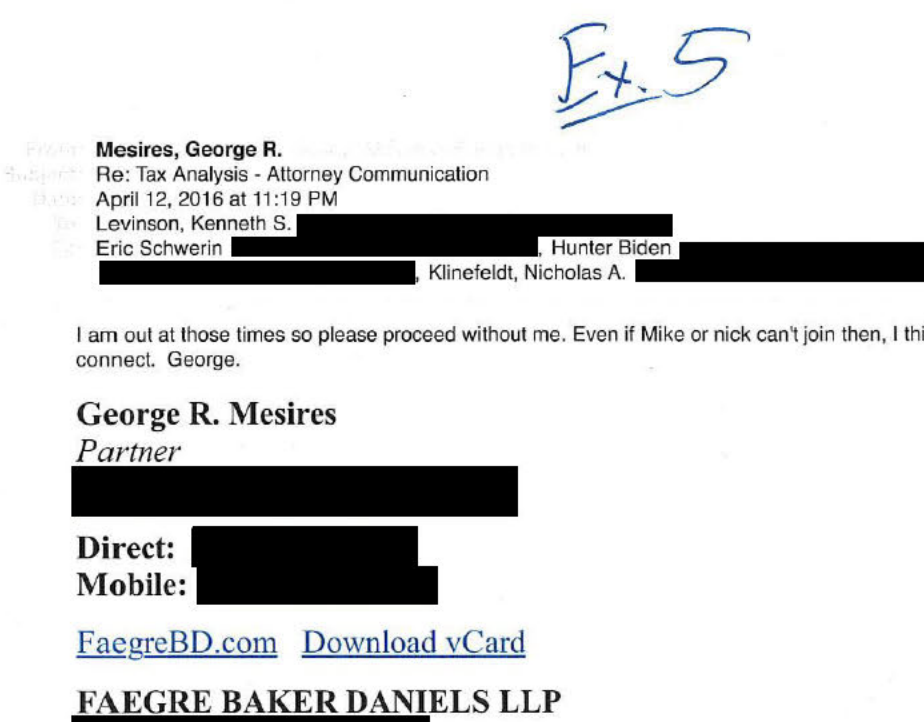
When Majority Counsel asked Shapley if he has seen that email, he and his attorney went off the record.
Have you seen this document before?
Mr. Lytle. Can we talk to our client just briefly.
MAJORITY COUNSEL 2. Of course. We can go off the record.
[Discussion off the record.]
MAJORITY COUNSEL 2. We’re back on the record.
Having had to consult his attorney about what the simple yes or no response was, Shapley came back to note that this was privileged.
BY MAJORITY COUNSEL 2: Q The question is whether you’ve seen this document before.
A No. Anything from George Mesires was considered privileged —
Q Okay.
A — attorney-client privilege and was not provided to us.
Q Okay. And so that was kept from you by the FBI?
A No. It would be a filter team.
Q Okay.
A When we get any information, and even from the laptop and hard drive, it went through filter reviews, and we only saw what came back as nonprivileged.
A long discussion ensued in which Republican lawyers complained that DOJ conducted privilege reviews for lawyers and accountants working for lawyers. It was immediately after that discussion that Majority Counsel asked whether the investigative team could review material made public from the laptop, as described above.
No, they couldn’t, Shapley explained, because they might see something that would taint the prosecution.
In response to a later question from the Minority, Shapley admitted that if he remained on the prosecution team, reviewing the Mesires letter would amount to taint.
In his response, he referred to Mesires as a “quote-unquote” attorney.
Q Okay. And this was back in 2017. Okay. And then on exhibit 5, it’s the same question, George Mesires, and I think you might have mentioned him earlier, do you know his relationship?
A Yeah. I know him to be a personal, quote, unquote attorney to Hunter Biden. And if I wasn’t taken off the case, I would have been tainted by this document
For example, in August 2020, we got the results back from an iCloud search warrant. Unlike the laptop, these came to the investigative team from a third-party record keeper and included a set of messages. The messages included material we clearly needed to follow up on. [my emphasis]
That’s how Shapley “quote-unquote” dealt with Mesires.
Whistleblower X, who admitted seeing videos online he hadn’t seen in material shared from the filter team, was different though.
As he was reading from an email that, he said, showed Lesley Wolf refusing to get approval for interviews, Whistleblower X stopped himself from reading one particular name.
Lesley Wolf says to me on September 9th, 2021: “I do not think that you are going to be able to do these interviews as planned. The document requests require approval from Tax Division. At present, Jack and Mark are racing to get the EWC motion on Stuart’s desk” — so Stuart was the [Acting] Deputy [Assistant] Attorney General, Stuart Goldberg at Tax Division — “Stuart’s desk for approval before he leaves town for a week. “Along with the approval for the” — and I’m going to leave the name out of that — “both of these items are higher priority and we can’t pull time and attention away to move these subpoenas through. [my emphasis]
In follow-up, Minority counsel asked Whistleblower X what name he had asked to leave out.
It was George Mesires.
Q Okay. You mentioned — this is a little ways later — I believe on September the 9th of 2021 that you had an email. You were reading through it, and you had mentioned that Stuart Goldberg was leaving town. You said there was a name that you wanted to leave out when you were reading the email. What was that name?
A So it was the name of Hunter’s personal counsel, George Mesires.
A year after complaining loudly that he hadn’t been provided stuff he saw on Twitter, he tried to subpoena Hunter Biden’s “quote unquote attorney.”
Whistleblower X’s Unclean Dirt
There’s one more detail that suggests whatever prosecutors found in email could have made the case unsustainable — and also makes Whistleblower X’s urgent concerns, in a meeting just over a week after NYPost reported on Rudy’s version of the laptop — far more suspect.
In what appears to be the last of his complaints about not getting information on the laptop (item 42), he said, as recorded by Shapley,
42 SA [redacted, probably X] — For items not seen by agents shouldn’t they see everything because if they have to testify to it they need to see it
a. Lesley response is that this is a historical review and we can discuss that later.
To get access to the entirety of the laptop, Whistleblower X made an argument about what he would need to do to prepare to be the key witness against Hunter Biden at trial.
That argument is 180 degrees the reverse from what he explained over and over in his testimony, about how he was avoiding anything that might taint him as a witness.
For example, he said he had been avoiding testimony to Congress to preserve his ability to testify.
I’d like to note that I wasn’t present at the leadership meeting on October 7th, 2022, that Mr. Shapley and leaders from the IRS were a part of with U.S. Attorney David Weiss, the meeting where he made the statements about not being in charge.
I also wanted to continue to protect the record and my ability to testify as the case agent in the future, which is also a part of the reason I didn’t come forward to you.
[snip]
I was interviewed by an investigator — I think they were with TIGTA. I told them, I didn’t leak anything. I thought that the leak might have come from either defense counsel, or from DOJ like the other ones came. But what I can tell you, and I’ve told this to the prosecution team, I’ve done everything that I can to keep my record clean and to keep my ability to testify as the case agent as clean as I possibly can.
He explained that he purposely wouldn’t write stuff down to preserve his ability to be summary witness.
Mr. X. On the record.
I just want to say that I made every effort to — when we work these cases, you have to be careful of what you might say that could be used against you if you were to go to trial or if you were to go in front of a grand jury. Usually, the IRS special agent is the final witness, the summary witness. So things that you put out there in emails, they can attack you at a later date.
So I did everything that I could to possibly make the record as clean as it possibly could, investigated the case, but in doing that, here’s all the things that happened because of that.
Shapley, on the other hand, did put all that in writing. When Minority Counsel pressed him on the fact that he really hadn’t disclosed any of this to supervisors, he described that he kept taking notes of bitch sessions so that the others could testify.
Q No one at IRS above — other than CI, no deputy commissioners, no commissioner? A That is correct. And, there was a common theme that and the co-case agent Christine Puglisi would — after all these pros team calls we would have a follow-up call. And sometimes FBI agents would be on there as well. And it was basically talking about the strategy and it often became like, Wow, they are not letting us do this. Can you believe they said that? Like that type of thing.
And we — in order to protect the record of the investigation basically it was me that could only document that, right? Because we wanted to make sure that the agents weren’t documenting things that would eventually be turned over in discovery and could somehow affect the viability of the case.
So that is something that I documented moving forward. And each time we were, like, Wow, they didn’t let us do the search warrant. Like she said — to overcome probable cause with a search warrant is, like, that is it, right? That is really, like, okay, well, you are going to go do it, because we want evidence that is unfiltered, right? But the whole point is we were like, well, there is no way they are not going to charge us. The evidence is there. They say the evidence is there. And we just really couldn’t believe that they would be doing something wrong. It was a very heavy burden to overcome from my experience and training to be, like, wow, there is something going on here.
[snip]
Now I want to talk about exhibit 6, which is your memo about the laptop and the hard drive. Was this memo provided to anyone?
A This memo was discussed in length with the case agent and co-case agent, but to protect the record, these I couldn’t send to them.
Q Okay.
A So after each time we had calls like this, I would have conversations with them. There was even a document that I produced where they were like, well, there was this problem, this problem, this problem. So I was like, I’ll record it, because we don’t want this to potentially be discoverable and have any issues in the future. So this is an example of that, where if there are at least two people that will say that we talked about this right after, and most of the conversation is to discuss what happened during that, to make sure that it was accurate.
Q But you don’t provide a copy to your supervisor or Mr. Fort or anyone else in your chain of command?
A No.
Q It just stays with you?
A That’s correct. [my emphasis]
Effectively, what Shapley and Whistleblower X described to Congress is that the IRS investigators were keeping a double set of books regarding the investigation.
To be fair, I think many — perhaps most! — government investigative teams do this. Short of that, they get an agent who investigated just a small corner of the whole, shielded from any ongoing investigation. Or a paralegal.
But if an investigator really really wants to take the stand against they guy they’ve been investigating for five years, they have to be sure to keep their books clean.
Reviewing the full Hunter Biden laptop would have tainted Whistleblower X as a witness, though. Even ignoring probable chain of custody problems with the laptop, reviewing the laptop as reviewed with a search warrant would have made Whistleblower X a tainted witness. Reviewing the laptop as Rudy released it after altering it, all the more so.
Plus, some of the details in the IRS’ double set of books about the Hunter Biden investigation raise questions not about DOJ approval processes, but about integrity of evidence, including the laptop and everything that came after that.
For example, because in September 2020, AUSA Lesley Wolf raised the possibility (and then debunked) that the investigation would shut down after the election, as this double set of books recorded, it raises real concerns about whether this investigation was nothing more than an election stunt, whether Bill Barr’s DOJ was simply investigating Hunter Biden for a campaign ploy. When Wolf described that DOJ was under fire for self-inflicted reasons, it’s unclear whether she was talking about past disclosures, like the Carter Page IG Report that focused on FBI’s conduct, or whether she was talking about Barr’s tampering in ongoing investigations, something that was quite pressing in September 2020.
Gary Shapley created a double set of books in the Hunter Biden investigation and described it as such. That double set of books raises ample questions about whether this investigation was about Hunter Biden … or his father.
Cleanup on Aisle Nine
The press release from Delaware US Attorney David Weiss’ office announcing two Informations as part of a plea deal stated the investigation into Hunter Biden was “ongoing.”
The team assigned to the plea deal includes two Special AUSAs, Leo Wise (who has been brought into troubled cases in the past) and Derek Hines, and includes Benjamin Wallace from DE USAO rather than the AUSA at the center of allegations of abuse, Lesley Wolf.
Whistleblower X — a big fan of hearsay — told the House Ways and Means Committee that FBI Agents were being treated the same way IRS Agents are: requiring that they report through their Special Agent in Charge to Weiss.
A I did hear from FBI that they were being treated the exact same way — that they had to communicate through their SAC to the U.S. Attorney in Delaware.
So in spite of Gary Shapley’s wails that his team got cut off as retaliation, there’s some reason to believe everyone did.
Whistleblower X also referenced two topics into which there might be an ongoing investigation. The first was a CEFC deal with Hunter Biden in 2017 and 2018.
MAJORITY COUNSEL 1. Can I go off the record? Mr. X. Yeah. Off the record.
[Discussion off the record.]
MAJORITY COUNSEL 1. Back on the record?
Mr. X. I don’t feel comfortable disclosing anything further on that issue.
The other involves the circumstances of how Kevin Morris paid off Hunter Biden’s tax debt in 2000.
A So on his 2020 tax return, personal tax return, Hunter stated: “See statement in 2020. The taxpayer received financial support from a personal friend totaling approximately $1.4 million. The parties agreed in 2020 to treat the support as a loan and later documented their agreement in a promissory note in the amount of $1.4 million, 5 percent interest. “The promissory note requires periodic payments between 2025 and 2027. The promissory note was executed by both parties on October 13th, 2021. “The taxpayer is treating this amount as a loan for tax purposes. The balance of the financial support is treated as a gift. No amount of the support is treated as a reported taxable event on this tax return.” So that’s what was filed with the return.
Q And has that transaction been investigated or —
A I’m no longer a part of an investigation related to that.
[snip]
Q It’s a voluntary interview. If you’re not comfortable saying, you don’t have to answer the question, any of our questions.
A It goes back to one of my — if there is potentially a current investigation that’s out there to —
Mr. Zerbe. Let’s go off the record.
[Discussion off the record.]
MAJORITY COUNSEL 2. Go back on the record?
Statutes of limitation on the latter event would not expire until at least 2025 (though, as noted, the terms of the loan only require that the President’s son start repaying the loan in 2025). It could well be that Hunter Biden, or his benefactor, will eventually be charged with a serious felony — potentially include campaign finance violations — for the way Joe Biden’s son eliminated some of his past tax exposure (though this post-dated the election).
So I think it very possible that Weiss effectively reset the Hunter Biden investigation as a way to move past a great deal of dodgy shit that went down in the last five years.
But amid the media attention Shapley has generated, there are signs that something else — not lefty political bias — undermined the case against Hunter Biden, potentially up to and including outright misconduct. There is a whole range of communications that may have made a prosecution of Hunter Biden unsustainable: documentation of political pressure from Trump, concerns about the sources of leads, evidence of potential taint, and a clear obsession with investigating Joe, not just Hunter.
Those thing should make a Hunter Biden prosecution unsustainable. And the people who kept a double set of books recording some of it are now wailing as if someone else blew the case.
When they may have.
The leaks that seem to have been the proximate cause of the turmoil may make — may already have made — such misconduct more apparent.





